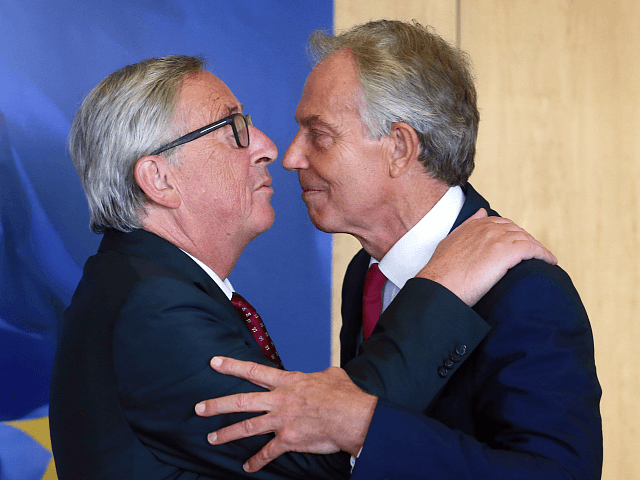Iraq War architect and former New Labour prime minister Tony Blair has pleaded the case for a second referendum on Brexit in the Irish press, alongside former Irish leader Bertie Ahern.
Blair, who topped a list of the top 100 “Worst Britons” during his premiership and even polled as less popular than his divisive hard-left successor Jeremy Corbyn as of 2017, claimed “Conversations between campaigners, politicians and the public will at times be difficult” ahead of the upcoming European Parliament elections, which Britain has to participate in despite voting to Leave the European Union almost three years ago.
“But politics is always full of difficult conversations. The important thing is to get to the right place in the end,” he wheedled, declining to state his idea of “the right place” is continued EU membership directly.
The joint article repeatedly stressed the importance of the Belfast Agreement, also known as the Good Friday Agreement — or Good Friday Appeasement, to critics — which largely ended the civil conflict between the British authorities and Provisional Irish Republic Army (IRA) in Northern Ireland, by releasing convicted terrorists from prison en masse, ending the use of symbols of British sovereignty such as St Edward’s Crown by many public bodies — including the Royal Ulster Constabulary (RUC), which was submerged into a new Police Service of Northern Ireland (PSNI) — and the creation of a devolved power-sharing executive, currently defunct.
EU loyalists often claim that the possibility of a so-called “hard border” with respect to customs between Northern Ireland and the Republic of Ireland will undermine the Belgast Agreement — although it is seldom explained how, given a “hard border” already exists for the purposes of VAT, currency, excise duties, etc.
“It is also time to be brutally honest about the real choices and the real consequences of those choices,” Blair and Ahern insisted.
“Part of [the Irish] nationalist aspiration is to have an open border between North and South, which then leads to broader questions about Single Market access and a customs union. Therein lies the problem,” their article suggested.
“It is precisely because of such issues as the Border that there should be a confirmatory vote on whatever now emerges from the Brexit process in parliament… They, the people of the UK, should have the final say,” it continued — neatly side-stepping the fact that voters will told repeatedly that their decision in 2016 would also be “final”.
“Understand that the public are undergoing the same process of churn and reflection as the politicians, and give them permission to be honest about that,” Blair lectured elsewhere in the piece, implying that voters are increasingly changing their minds on Brexit and just need their political leaders to let them know it’s OK to do so — a claim which is without evidence.
There is also little reason to believe that the Remainer-dominated House of Commons is experiencing much in the way of “churn and reflection”, with anti-Brexit MPs being much the same people as in 2016 — indeed, most switchers seem to be politicians who have flipped from Remain to Leave, if anything.
“Reconciliation. Tolerance. Mutual trust. Respect for the views of others. A shared desire to reach the right conclusion on terms that all but the most extreme can live with and accept,” Blair concluded regardless, appearing to pre-emptively dismiss anyone who failed to abide by a future referendum in which Brexit was cancelled as an extremist — unlike the Remain refuseniks currently fighting the 2016 referendum result, like himself.

COMMENTS
Please let us know if you're having issues with commenting.